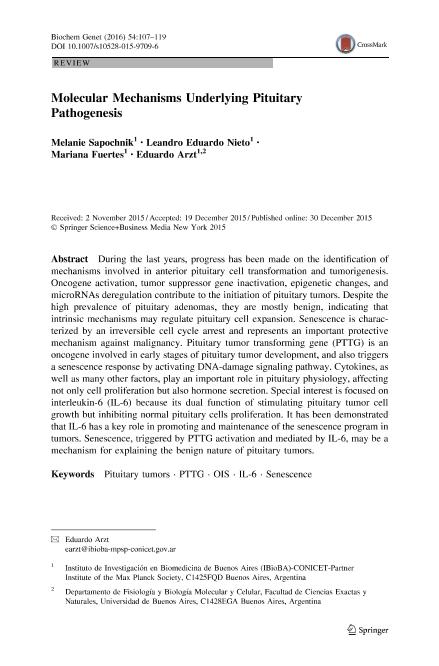Artículo
Molecular Mechanisms Underlying Pituitary Pathogenesis
Fecha de publicación:
04/2016
Editorial:
Springer/Plenum Publishers
Revista:
Biochemical Genetics
ISSN:
0006-2928
Idioma:
Inglés
Tipo de recurso:
Artículo publicado
Clasificación temática:
Resumen
During the last years, progress has been made on the identification of mechanisms involved in anterior pituitary cell transformation and tumorigenesis. Oncogene activation, tumor suppressor gene inactivation, epigenetic changes, and microRNAs deregulation contribute to the initiation of pituitary tumors. Despite the high prevalence of pituitary adenomas, they are mostly benign, indicating that intrinsic mechanisms may regulate pituitary cell expansion. Senescence is characterized by an irreversible cell cycle arrest and represents an important protective mechanism against malignancy. Pituitary tumor transforming gene (PTTG) is an oncogene involved in early stages of pituitary tumor development, and also triggers a senescence response by activating DNA-damage signaling pathway. Cytokines, as well as many other factors, play an important role in pituitary physiology, affecting not only cell proliferation but also hormone secretion. Special interest is focused on interleukin-6 (IL-6) because its dual function of stimulating pituitary tumor cell growth but inhibiting normal pituitary cells proliferation. It has been demonstrated that IL-6 has a key role in promoting and maintenance of the senescence program in tumors. Senescence, triggered by PTTG activation and mediated by IL-6, may be a mechanism for explaining the benign nature of pituitary tumors.
Palabras clave:
Il-6
,
Ois
,
Pituitary Tumors
,
Pttg
,
Senescence
Archivos asociados
Licencia
Identificadores
Colecciones
Articulos(IBIOBA - MPSP)
Articulos de INST. D/INV.EN BIOMED.DE BS AS-CONICET-INST. PARTNER SOCIEDAD MAX PLANCK
Articulos de INST. D/INV.EN BIOMED.DE BS AS-CONICET-INST. PARTNER SOCIEDAD MAX PLANCK
Citación
Sapochnik, Melanie Denise; Nieto, Leandro Eduardo; Fuertes, Mariana; Arzt, Eduardo Simon; Molecular Mechanisms Underlying Pituitary Pathogenesis; Springer/Plenum Publishers; Biochemical Genetics; 54; 2; 4-2016; 107-119
Compartir
Altmétricas




